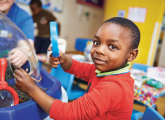From the very beginning, the Montessori approach has focused on supporting the least fortunate children and families in society, explains Barbara Isaacs…
You may already be aware that Maria Montessori began her teaching career working with disadvantaged children in Rome in 1907. She was given a room in a newly built block of flats destined for migrant families who arrived in Rome at the start of the 20th century in search of work from both the Italian countryside and abroad.
All she started with was an empty room. The owners of the property simply wanted to control those children who were too big to accompany their mothers to work, or too small to attend compulsory education. They did not want them roaming the streets getting up to mischief. Little did they know that this work with the disadvantaged community would be the beginning of a now globally accepted education system.
Montessori didn’t begin with preconceived ideas of how she would educate the children; however, she was clear about providing a safe haven for them and called her school The Children’s House or Casa dei Bambini. She began by giving the children an opportunity to learn to look after themselves. She taught them how to wash themselves, brush their hair and clean their teeth. Healthy inexpensive meals were organised daily, and the children stayed at nursery all day. This focus on children’s independence has remained at the heart of Montessori nursery education to this day.
Another interesting feature of the first Montessori nursery was that the teacher lived in the same block of flats as the setting. This made her accessible to the families and facilitated the compulsory weekly meetings between the mothers and the teacher. Montessori was passionate about changing the lives of these children. She was also aware that to make a change she needed to engage the families. In this first learning community the children were the agents of change – they brought back principles of hygiene and showed they could look after themselves. As the relationship between the families and the nursery teacher developed, the mothers urged Montessori to introduce reading and writing to their children, so that they would have the tools to better their lives. Gradually The Children’s House evolved into what we understand by Montessori education today.
In developing her own pedagogy, Montessori used what she learned about children’s development during her work with those with disability following her medical training. She built on the research conducted by French physicians Itard and Seguin. In addition to acquiring the skills of independence and care of the environment, the children were introduced to sensorial activities which were designed to refine and develop their senses, building on their early sensory experiences.
Today, Montessori sensory activities provide children with a foundation for concept formation, development of vocabulary as well as preparation for more formal and academic learning of reading, writing and early numeracy.
Montessori was always committed to providing the best possible education for the youngest children in our society because she recognised the importance of early years in formation of attitudes and learning dispositions. It is unfortunate that due to global lack of government policies and funding for the early childhood education, her approach continues to flourish only within private education and to this day is perceived as the domain of the affluent.
This was not Montessori’s intention. Happily there are a number of worldwide initiatives offering Montessori education to children across a wide range of social and economic groups. For example, the Tibetan government in exile in Northern India provides Montessori education for all the young children in its schools. There are many initiatives across Africa, particularly in some of the townships of South Africa. One such project in the UK is spearheaded by the Montessori St. Nicholas charity, committed to promoting Montessori education in the EYFS units of primary schools, particularly within disadvantaged communities such as the one in Gorton, Manchester. There are other primary schools in Essex and in Redbridge that also benefit from this initiative.
Barbara Isaacs is the academic director of Montessori Centre International.

ICT in Early Years – Activity and assessment ideas
Editors picks

Pirate activities EYFS – 18 science-themed ideas to try
Editors picks
